- Home
- Connie Willis
To Say Nothing of the Dog Page 15
To Say Nothing of the Dog Read online
Page 15
“Whoever stole it must have taken it back up the river,” Terence said, and ran the rest of the way across the river and back up to the lock.
The lock-keeper was standing on top of the lock, poking at the sluice with his boathook.
“Did our boat go back through the lock?” Terence shouted to him.
The lock-keeper put his hand to his ear and shouted back, “What?”
“Our boat!” Terence shouted, cupping his hands around his mouth. “Did it go back through the lock?”
“What?” he bellowed back.
“Did our boat” Terence said, pantomiming the shape of a boat, “go back—” he made a sweeping motion upriver, “through the lock?” He pointed exaggeratedly at the lock.
“Boats go through the lock?” the lock-keeper shouted. “Of course boats go through the lock. What else do you think it’s for?”
I glanced around, looking for someone, anyone else who might have seen the boat, but Iffley was completely deserted. Not even the churchwarden was in evidence, putting up “No shouting” signs. I remembered Tossie had said he was having his tea.
“No! Our boat!” Terence shouted. He pointed first at himself and then at me. “Did it go back through the lock?”
The lock-keeper looked indignant. “No, you can’t go through the lock without a boat! What sort of foolery are you up to?”
“No,” Terence shouted. “Someone’s stolen the boat we hired!”
“Wire?” The lock-keeper shook his head. “The nearest telegraph’s in Abingdon.”
“No. Not wire. Hired!”
“Liar?” he said and raised his pole threateningly. “‘Oo you callin’ a liar?”
“No one,” Terence said, backing up. “Hired! The boat we hired!”
The lock-keeper shook his head again. “What you want’s Folly Bridge. Man name of Jabez.”
Cyril and I wandered back down to the bridge, and I stood there, leaning over it and thinking about what Verity had told me. She’d saved a cat from drowning and then stepped into the net with it, and the net had opened.
So it must not have caused an incongruity, because if it would have, the net wouldn’t have opened. That’s what had happened the first ten times Leibowitz had tried to go back to assassinate Hitler. The eleventh he’d ended up in Bozeman, Montana in 1946. And nobody’s ever been able to get close to Ford’s Theater or Pearl Harbor or the Ides of March. Or Coventry.
I thought T.J. and Mr. Dunworthy were probably right about the increased slippage around Coventry, and I wondered why it hadn’t occurred to us before. Coventry was obviously a crisis point.
Not because the raid had done significant damage. The Luftwaffe had only damaged, not destroyed, the aircraft and munitions factories, and they were up and running again within three months. They’d destroyed the cathedral, of course, which had enlisted outrage and sympathy from the States, but even that hadn’t been critical. The Blitz had already stirred up plenty of American support, and Pearl Harbor was only three weeks away.
What was critical was Ultra, and the Enigma machine which we’d smuggled out of Poland and were using to decipher the Nazis’ codes, and which, if the Nazis had found out we had it, could have changed the course of the entire war.
And Ultra had warned us of the raid on Coventry. Only obliquely, until late in the afternoon of the fourteenth, which had made it impossible to do more than notify Command and take impromptu defensive measures, and those (because history’s a chaotic system) had cancelled each other out. Command had decided the main attack would be on London, no matter what Intelligence said, and sent their planes up accordingly, and the attempts to jam the pathfinder beams had failed because of an error in calculations.
But secrets are always pivotal events. A stray word could have endangered the safety of the Intelligence setup. And if something, anything, had happened to make the Nazis suspicious—if the cathedral had been miraculously saved or the entire RAF had shown up over Coventry, even if someone had talked—“Loose lips sink ships”—they would have changed their code-machines. And we would have lost the battles of El Alamein and the North Atlantic. And World War II.
Which explained why Carruthers and the new recruit and I had ended up in the rubble and the marrows field. Because around a crisis point, even the tiniest action can assume importance all out of proportion to its size. Consequences multiply and cascade, and anything—a missed telephone call, a match struck during a blackout, a dropped piece of paper, a single moment—can have empire-tottering effects.
The Archduke Ferdinand’s chauffeur makes a wrong turn onto Franz-Josef Street and starts a world war. Abraham Lincoln’s bodyguard steps outside for a smoke and destroys a peace. Hitler leaves orders not to be disturbed because he has a migraine and finds out about the D-Day invasion eighteen hours too late. A lieutenant fails to mark a telegram “urgent” and Admiral Kimmel isn’t warned of the impending Japanese attack. “For want of a nail, the shoe was lost. For want of a shoe, the horse was lost. For want of a horse, the rider was lost.”
And around those attractors, there was radically increased slippage and net closures.
Which must mean Muchings End wasn’t a crisis point, and the cat hadn’t changed history, particularly since it would only have required a few minutes’ slippage to prevent the whole thing. Verity wouldn’t even have had to have ended up in Bozeman, Montana. If she’d come through five minutes later, the cat would already have gone under. Five minutes earlier, and she’d have been inside the house and missed the whole thing.
And it wasn’t as if this were Queen Victoria’s cat (in spite of her name) or Gladstone’s or Oscar Wilde’s. It was hardly in a position to affect world events, and 1888 wasn’t a critical year. The Indian Mutiny had ended in 1859 and the Boer War wouldn’t start for another eleven years. “And it’s only a cat,” I said out loud.
Cyril looked up, alarmed.
“Not here,” I said. “It’s probably safely back at Muchings End by now,” but Cyril got up and began looking warily about.
“No! Thieves, not sheaves!” Terence was yelling, his voice drifting toward us over the water. “Thieves!”
“Sieves?” the lock-keeper bellowed back. “This is a lock, not an ironmonger’s.”
Eventually, he waved his arm dismissively at Terence and went inside the lockhouse.
Terence hurried over. “Whoever took it went that way,” he said. “The lock-keeper pointed downstream.”
I was not at all sure of that. It seemed to me just as likely that the gesture had meant, “Go on, I’ve had it with talking to you,” or even, “Get the bloody hell out of here!” And the opposite direction was better in regard to keeping Terence away from Tossie.
“Are you certain?” I said. “I thought he pointed upstream.”
“No,” Terence said, already across the bridge. “Definitely downstream,” and galloped off down the towpath.
“We’d better hurry,” I said to Cyril, “or we’ll never catch up to him,” and we set off after him, past the straggle of Iffley’s cottages and a line of tall poplars and up a low hill, from which we could see a long stretch of river. It glittered emptily. “Are you sure they went this way?”
He nodded without slackening his pace. “And we’ll find them and get the boat back. Tossie and I are meant to be together, and no obstacle can keep us apart. It’s fated, like Tristan and Isolde, Romeo and Juliet, Héloïse and Abelard.”
I didn’t point out that all of the aforementioned had ended up dead or severely handicapped, because it was all I could do to keep up. Cyril wobbled after us, panting.
“When we catch up to them, we’ll go back and fetch Professor Peddick and take him back to Oxford and then row down below Abingdon and camp for the night,” Terence said. “It’s only three locks away. If we work at it, we should be able to make Muchings End by teatime tomorrow.”
Not if I could help it. “Won’t that be a rather tiring journey?” I said. “My physician said I wasn’t to overtire myself.
”
“You can nap while I row. Tea’s the best time. They have to ask you to stay, it’s not like dinner or something, it doesn’t require a formal invitation or dressing or anything. We should be able to make Reading by noon.”
“But I’d hoped to see some of the sights along the river,” I said, racking my brain to think what they were. Hampton Court? No, that was below Henley. So was Windsor Castle. What had the three men in a boat stopped to look at? Tombs. Harris was always wanting to stop and look at somebody or other’s tomb.
“I’d hoped to see some tombs,” I said.
“Tombs?” he said. “There aren’t any interesting ones along the river, except for Richard Tichell’s at Hampton Church. He threw himself out of one of the windows of Hampton Court Palace. And at any rate, Hampton Church is past Muchings End. If Colonel Mering likes us, we might be asked to dinner. Do you know anything about Japan?”
“Japan?” I said.
“That’s where the fish are from,” he said obscurely. “The best thing, of course, would be if we were asked to stay a week, but he doesn’t like houseguests, says it disturbs them. The fish, I mean. And he went to Cambridge. Perhaps we could pretend to be spiritualists. Mrs. Mering’s mad for spirits. Did you pack evening clothes?”
The time-lag must be catching up with me. “Do spiritualists wear evening clothes?” I asked.
“No, long, flowing robe sort of things, with sleeves you can hide tambourines and cheesecloth and things in. No, for dinner, in case we’re asked.”
I had no idea whether there were evening clothes in my luggage or not. When we caught up to the boat, if we caught up to the boat, I needed to go through my bags and see exactly what Warder and Finch had sent with me.
“It’s too bad we haven’t found Princess Arjumand,” Terence said. “That would get us an invitation to stay. The lost lamb and the fatted calf and all that. Did you see Tossie when she ran down the bank and asked me if I’d found her? She was the loveliest creature I’d ever seen. Her curls bright as gold and her eyes, ‘blue as the fairy-flax, her cheeks like the dawn of day!’ No, brighter! Like carnations! Or roses!”
We went on, Terence comparing Tossie’s various features to lilies, berries, pearls, and spun gold, Cyril thinking longingly of shade, and me thinking about Louis the Sixteenth.
It was true that Princess Arjumand wasn’t Queen Victoria’s cat and Muchings End wasn’t Midway Island, but look at Drouét. He hadn’t been anybody either, an illiterate French peasant who normally would never have made it into the history books.
Except that Louis the Sixteenth, escaping from France with Marie Antoinette, leaned out the window of his carriage to ask Drouét directions, and then, in one of those minor actions that change the course of history, tipped him a banknote. With his picture on it.
And Drouét tore ahead through the forest to raise a force to stop the carriage, and failing that, dragged a cart out of a barn and across the road to block their way.
And what if an historian had stolen the cart, or waylaid Drouét, or warned Louis’s driver to take another road? Or what if, back at Versailles, an historian had stolen the banknote and replaced it with coins? Louis and Marie would have made it to their loyalist army, put down the Revolution, and changed the entire course of European history.
For want of a cart. Or a cat.
“We should be coming to Sandford Lock soon,” Terence said cheerfully. “We can ask the lock-keeper if he’s seen the boat.”
In a few minutes, we came to the lock, and I thought we were going to have to endure another interminable and incomprehensible conversation, but this time Terence’s earnest shouts failed even to bring the lock-keeper out, and after several minutes he said, undaunted, “There’ll be someone at Nuneham Courtenay,” and set off again.
I didn’t even ask how far Nuneham Courtenay was, for fear of the answer, and beyond the next bend in the river there was a line of willows next to the towpath, obscuring the view. But when we came round the bend, Terence was standing in front of a thatched cottage, looking thoughtfully at a little girl in the front garden. She was sitting on a swing in a blue-and-white-striped pinafore whose petticoats billowed up around her, holding a white cat and talking to it.
“Dear sweet pussy,” she said, “you love to go up in a swing, don’t you? Up in the air so blue?”
The cat didn’t answer. It was sound asleep.
Cats weren’t extinct yet in the Forties, so I’d seen them before, but, except for that sooty streak in the cathedral, I had yet to see one that was awake. Verity had said time-lag had made the cat she brought through the net sleepy, but I wasn’t convinced this wasn’t their normal state. The black and-orange calico at the Nativity of the Virgin Mary Fête had slept the entire duration of the fete on top of a crocheted afghan on the Fancy Works Table.
“I say, what do you think?” Terence said, indicating the little girl.
I nodded. “She might have seen the boat. And she can’t be any worse than the lock-keeper.”
“No, no. Not the child. The cat.”
“I thought you said Miss Mering’s cat was black,” I said.
“It is. With white feet and a white face,” he said. “But with a bit of boot-blacking in the right spots—”
“No,” I said. “You said she was very attached to her pet.”
“She is, and she’ll be extremely grateful to the person who finds it. You don’t think some soot, carefully applied . . .”
“No,” I said, and walked over to the swing. “Have you seen a boat?”
“Yes, sir,” she said politely.
“Excellent,” Terence said. “Who was in it?”
“In what?” she said.
“In the boat,” Terence said.
“Which boat?” she said, petting the cat. “There are lots and lots of boats. This is the Thames, you see.”
“This was a large green boat with a great deal of luggage piled in it,” Terence said. “Did you see it?”
“Does he bite?” the little girl asked Terence.
“Who? Mr. Henry?” Terence said.
“Cyril,” I said. “No, he doesn’t bite. Did you see a boat like that? With a lot of luggage?”
“Yes,” she said, and got off the swing, shifting the cat to her shoulder. It didn’t wake up. “It went that way,” she said and pointed down the river.
“We know that,” Terence said. “Did you see who was in the boat?”
“Yes,” she said, patting the cat as if she were burping a baby. “Poor, dear pussy, did the big dog frighten you?”
The cat slumbered on.
“Who was in the boat?” I said.
She transferred the cat back to her arms and cradled it “A rey erent.”
“A reverend? You mean, a clergyman? A verger?” I said, wondering if the churchwarden had posted a sign saying, “No docking,” and carted the boat off as punishment.
“Yes,” she said. “Wearing a robe.”
“Professor Peddick,” I said.
“Did he have white hair?” Terence said. “And muttonchop whiskers?”
She nodded, picking the cat up under the front legs and holding it out in front of her like a doll. “What a wicked dog, to frighten you so!”
The cat still didn’t wake up.
“Come on, then,” Terence said, already far ahead. “We should have thought of that,” he said when the wicked dog and I caught up to him, “that it was Professor Peddick who took the boat. He can’t have gone far.”
He gestured at the river, winding slowly off to the southwest between the flat fields. “It looks exactly like the plain of Marathon.”
It might have been a spitting image, for all I knew, but either the resemblance hadn’t struck Professor Peddick or he could row faster than I thought. Neither he nor the boat were anywhere to be seen.
Terence didn’t seem bothered. “We’re bound to spot him soon.”
“What if we don’t catch up to him?” I said.
“We shall,”
he said. “There’s a lock five miles from here. He’ll have to wait to go through it.”
“Five miles?” I said weakly.
“And we must catch up to him. That’s how Fate works. Like Antony and Cleopatra.”
Yet another love story that hadn’t turned out well.
“Would Antony have let a little thing like a lost boat stand in his way? Though I suppose in his case it would have been a barge.”
We struggled on. The Victorian sun beat down, Terence hurried on at an energetic pace, comparing Tossie to angels, fairies, sprites, and Cleopatra (a truly bad end); Cyril began to take on the demeanor of a Bataan Death March participant; and I thought longingly of sleep and tried to calculate how long I had been up.
I had been here since ten, and my pocket watch said nearly IV, so that was six hours, and I had spent three hours in the lab being prepped, an hour in Mr. Dunworthy’s office, a half hour on the playing fields of Oxford, ditto in Infirmary, which added up to eleven, and that didn’t count the two hours I’d spent looking for the bishop’s bird stump and the hour I’d spent looking for the cathedral, and the five hours I’d spent at the Harvest Charity Bazaar and Scrap Metal Drive. Nineteen.
When had I gone through to the bazaar, in the morning or the afternoon? Afternoon, because I was just heading back to my rooms for dinner when Lady Schrapnell caught me and put me on jumble sale duty.
No, that was the day before. Or the day before that. How long had I been doing jumble sales? Years. I had been up for years.
“We’re going to have to give this up,” I said, thinking wearily of how far it was back to Oxford. Perhaps we could sleep in the church in Iffley. No, it was only open until four. And no doubt there was a “No sleeping in pews” sign tacked to the hymnal rack.
“Look!” Terence cried. He pointed to a willow-covered island in the middle of the river. “There he is!”
It was definitely Professor Peddick. He was bending over at the very edge of the river, his robe fluttering, peering through his pince-nez at the water.
“Professor Peddick!” Terence shouted to him, and he nearly toppled in.
The professor grabbed hold of an uncertain-looking willow branch and steadied himself. He adjusted his pince-nez and peered at us.

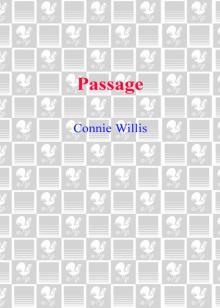 Passage
Passage Bellwether
Bellwether Blackout
Blackout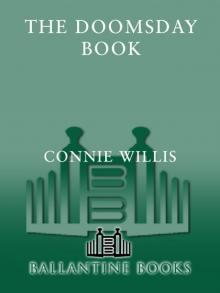 Doomsday Book
Doomsday Book A Lot Like Christmas: Stories
A Lot Like Christmas: Stories Water Witch
Water Witch To Say Nothing of the Dog
To Say Nothing of the Dog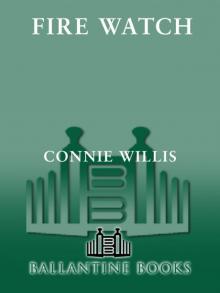 Fire Watch
Fire Watch The Winds of Marble Arch and Other Stories
The Winds of Marble Arch and Other Stories Uncharted Territory
Uncharted Territory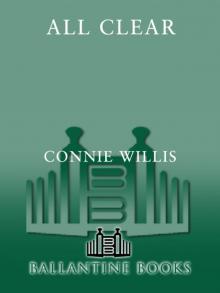 All Clear
All Clear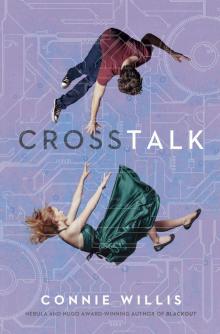 Crosstalk
Crosstalk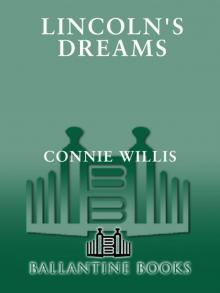 Lincoln's Dreams
Lincoln's Dreams Miracle and Other Christmas Stories
Miracle and Other Christmas Stories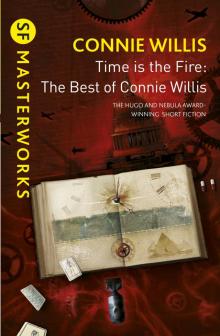 Time is the Fire
Time is the Fire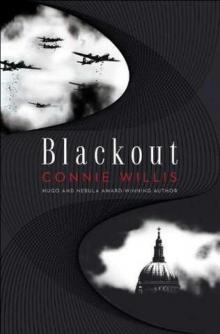 Blackout ac-1
Blackout ac-1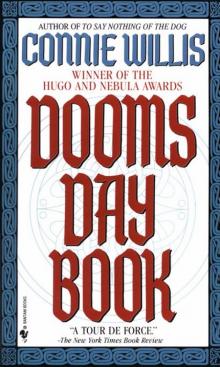 Dooms Day Book
Dooms Day Book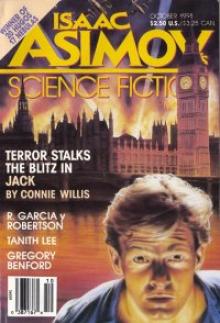 Jack
Jack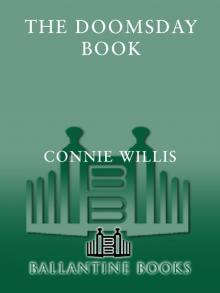 The Doomsday Book
The Doomsday Book Terra Incognita
Terra Incognita The Best of Connie Willis
The Best of Connie Willis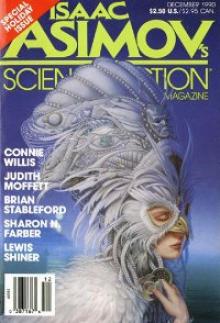 Cibola
Cibola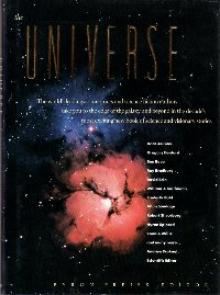 Schwarzschild Radius
Schwarzschild Radius Even the Queen
Even the Queen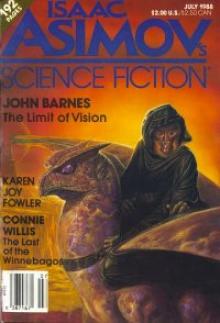 The Last of the Winnebagos
The Last of the Winnebagos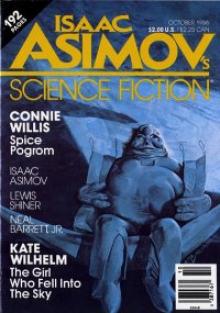 Spice Pogrom
Spice Pogrom Oxford Time Travel 1 - Blackout
Oxford Time Travel 1 - Blackout At The Rialto
At The Rialto A Lot Like Christmas
A Lot Like Christmas